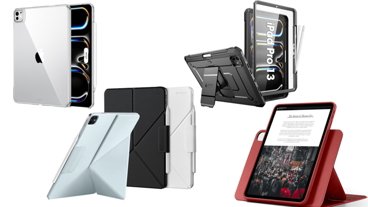Amazon Kindle sales strong, but many buyers already own Apple's iPad
In a press release this week, Amazon said that the third-generation Kindle is now the best-selling product in the online retailer's history. The Kindle surpassed the book "Harry Potter and the Deathly Hallows" to take the top spot.
Amazon did not, however, disclose any actual sales figures for its e-ink-based book reader. It simply noted that the Wi-Fi and 3G Kindle models were the best-selling products on Amazon.com this holiday season.
"We're seeing that many of the people who are buying Kindles also own an LCD tablet," Amazon Chief Executive Jeff Bezos said. "Customers report using their LCD tablets for games, movies, and web browsing and their Kindles for reading sessions.
"They report preferring Kindle for reading because it weighs less, eliminates battery anxiety with its month-long battery, and has the advanced paper-like Pearl e-ink display that reduces eye-strain, doesn't interfere with sleep patterns at bedtime, and works outside in direct sunlight, an important consideration especially for vacation reading."
Of course, "LCD tablet" largely refers to Apple's iPad, the dominant device in the touchscreen tablet market. When the iPad launched earlier this year, it also marked the debut of the iBooks application for iOS devices, launching Apple's entrance into the e-book market and direct competition with the Amazon Kindle.
Despite continued strong sales of the Kindle, recent studies have found the e-ink reader has lost significant market share to the iPad. One survey released in November found that the Kindle carries 47 percent of the e-reader market, down from 68 percent in February 2010.
That survey found that Kindle readers are more likely to use the device for books, while iPad owners will use the color touchscreen to read more newspapers, magazines and websites.
Kindle is not only a device, but a platform, with a Kindle application available for both the iPad and iPhone. Amazon also allows customers to sync their books with traditional computers via the Kindle for Mac software.
Amazon also released facts about the 2010 holiday shopping season, many of them related to Apple. Among the best-selling electronics, in addition to the Kindle, was the 8GB iPod touch.
The online retailer also revealed that iPad and iPhone users were most likely to shop on Sunday. And the last Local Express Delivery order delivered in time for Christmas was a Mac Mini ordered at 1:41 p.m. on Christmas Eve. It was delivered to a customer in Woodinville, Wash., that evening at 8:04 p.m.
 Katie Marsal
Katie Marsal













 Amber Neely
Amber Neely
 Thomas Sibilly
Thomas Sibilly
 AppleInsider Staff
AppleInsider Staff
 William Gallagher
William Gallagher
 Malcolm Owen
Malcolm Owen
 Christine McKee
Christine McKee










46 Comments
Not hugely surprising, the bombardment of iPad ads I see every week look like they've dropped all mention of books, indicating maybe people arnt hugely interested in it as a e-reader. While at the same time I know people that don't even read books talking about getting a kindle.
I own a Kindle 3- one of the best purchases I've ever made. And seeing how it sold out on Amazon, so have many others.
Having said that, I will also buy an iPad, 2nd generation that is.
Analysts really need to stop comparing the two items, there is no comparison.
It's like comparing a DVD player to a computer with a DVD-Rom drive.
Of course, it seems good strategy for Amazon to imply that if one already owns an iPad, buying a Kindle still makes sense.
It is true that Apple needs to do something to improve search facilities both in the iTunes store and in the iBook store, but especially in the last one.
Have some backbone and give us sales figures. Otherwise, you're about as reliable as the RIM "wonder twins" saying the PlayBook is 'way better than the iPad'. Sheesh..
The fact that Amazon is trying to market the Kindle as a great secondary product to the iPhone is an indicator that sales are leveling-off. As a consumer I need to make choices....I need my iPhone at all times and I take the iPad on the road. I would rather read from my iPad than adding a Kindle.
Plus, I just find it plain shady that Amazon is hiding sales figures. If its a great strategy, why doesn't Apple and Google do the same? Anyone with any common sense knows that Amazon is boosting hype to hide the fact that the Kindle sales would not be as impressive if we knew the real sales figures. It doesn't take a genius to figure that out.